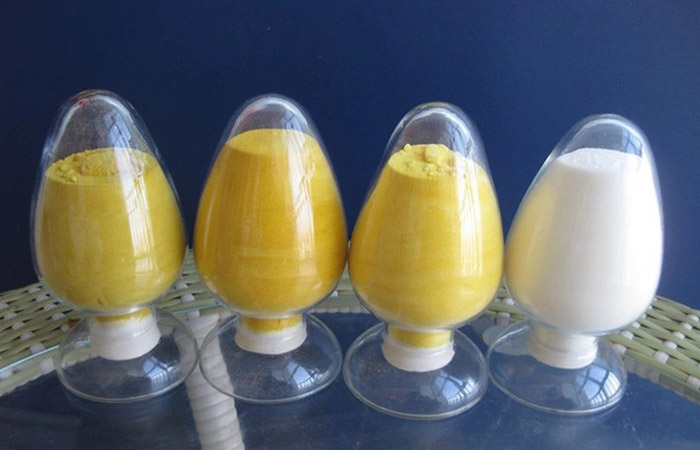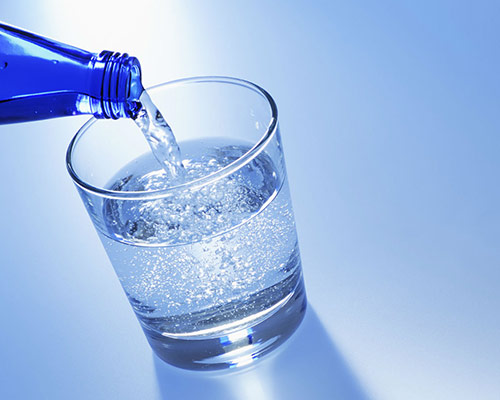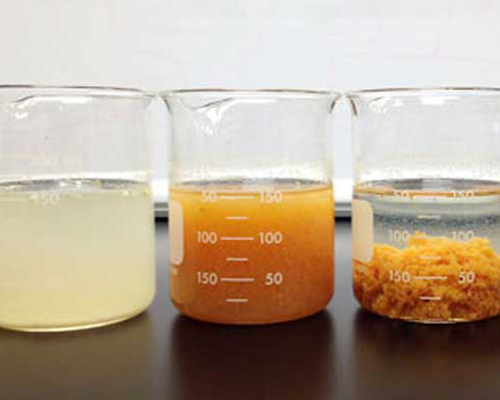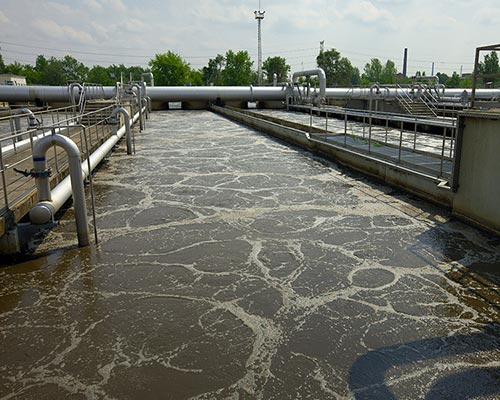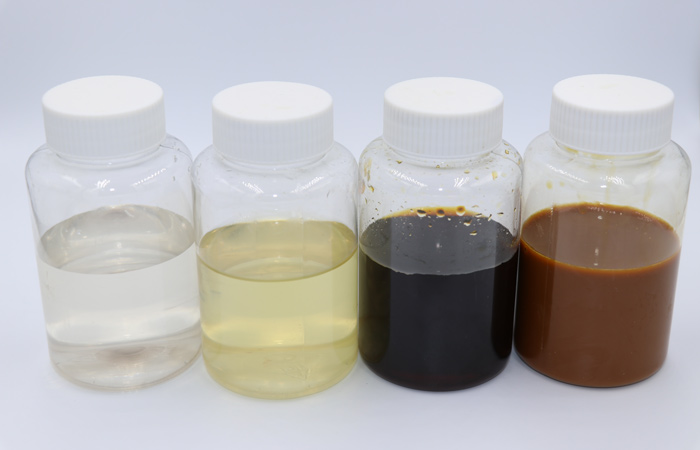- Name: Poly Aluminium Chloride
- Appearance: Powder/Liquid
- Type: FB01, FB02, FB03, FB04
- PH Value: 3.5-5.0
- CAS No: 1327-41-9
- MF: {AL2 (OH) nCL6-n} m
- HS Code: 28273200
Poly aluminium chloride (PAC) is a new type of high-performance inorganic polymer flocculant. It is an inorganic polymer synthesized by aluminum chloride, aluminum hydroxide, alumina or other inorganic aluminum compounds with hydrochloric acid. PAC powder is very soluble in water, so it has the features of wide application range of PH value, large granule and fast settling speed. Therefore, PAC poly aluminum chloride is mainly used for industrial wastewater, drinking water, swimmin pool water,etc.
Different Types of PAC Chemicals for Sale
PAC chemical for water treatment can be divided into two types: solid powder and liquid. And solid poly aluminium chloride powder is divided into white, light yellow, golden yellow and brown according to different colors, and its corresponding liquid is colorless and transparent, slightly yellow, light yellow to yellowish brown. And their alumina content is also different. Usually, poly aluminium chloride with different colors will have certain differences in application and production process.
White PAC powder 30% (FB01) for drinking water treatment is called high purity iron-free white or food grade poly aluminium chloride. Compared with other grade poly aluminum chloride, white PAC is the highest quality product. The main raw materials are high-quality aluminum hydroxide powder, Hydrochloric acid, the production process of white PAC chemical adopts the most advanced technology spray drying method in China. White poly aluminium chloride can be used in paper sizing agent, sugar decolorization and clarifying agent, tanning, medicine, cosmetics, precision casting and water treatment and other fields.
The light yellow PAC chemical (FB02) is mainly used for drinking water treatment, especially strict restrictions on the content of heavy metals. Generally, the treated water is clear without precipitation, the content of Al2O3 is about 30 (±0.5), the powder is fine, the particles are uniform, the flocculation effect is good, the purification is efficient and stable, the dosage is small, and the cost is low.
The production process is spray drying method, and the raw material is aluminum hydroxide powder, hydrochloric acid and calcium aluminate powder.
The production process is drum drying method. PAC FB03 is also the most widely used high-efficiency flocculant in the market, and it has good flocculation effect in sewage treatment. Therefore, the gold yellow poly aluminum chloride PAC is the best choice for industrial water supply, industrial wastewater, industrial water cycle and urban sewage treatment.
For PAC FB04 chemical, its production process is drum drying method, which has the excellent effects in sewage treatment. The raw materials are calcium aluminate powder, hydrochloric acid, bauxite and iron powder. Generally speaking, the more iron powder added, the darker the color will be. So the iron content is higher than other PAC poly aluminum chloride. It is a water treatment product produced according to the special requirements of individual customers for water treatment.
With its excellent flocculation efficiency, wide adaptability, low overall cost, and ease of use, PAC has become an indispensable key chemical in modern water treatment, largely replacing traditional aluminum and iron salt coagulants (such as aluminum sulfate and ferric chloride). Its key advantages are reflected in the following aspects:
1. Highly Efficient Flocculation and Settling Performance
Forms Large, Dense, and Rapidly Settling Flocs: Upon hydrolysis in water, pac chemical for water treatment produces a large number of positively charged, high-valent polynuclear complexes that effectively neutralize the negative charge of colloidal particles. Through bridging adsorption, they form large, dense flocs (commonly known as “flocs”). This results in significantly faster settling than traditional coagulants, effectively improving the treatment capacity of water treatment facilities.
Excellent Water Purification: It has a powerful charge-neutralizing and bridging effect on colloids and particulate matter in water, effectively removing turbidity, color, suspended solids, heavy metal ions, and algae. The treated water exhibits enhanced clarity.
2. Wide Adaptability
Wide pH Range: PAC chemical for water treatment performs well in a wide pH range of 5.0-9.0, while traditional aluminum sulfate has a narrower optimal pH range (typically 6.5-7.5). This eliminates the need for frequent pH adjustments when treating raw water with varying pH levels, making PAC easier to operate.
Good Temperature Adaptability: PAC maintains excellent flocculation even at low temperatures (<5°C), while traditional aluminum sulfate has difficulty hydrolyzing at low temperatures, significantly reducing its effectiveness.
3. Low Chemical Requirement, High Cost-Effectiveness
High efficiency means low dosage: To achieve the same treatment effect, the dosage of PAC water treatment chemical is typically only 1/2 to 1/3 of that of traditional aluminum sulfate. This not only reduces direct chemical costs but also transportation and storage expenses.
Reduced Sludge Treatment Costs: Due to the low dosage and the dense alum flocs produced, the resulting sludge volume is relatively small, reducing the difficulty and cost of subsequent sludge dewatering and treatment.
4. Low Corrosiveness and Safe Operation
PAC has a high alkalinity, resulting in a relatively low chloride ion content in its aqueous solution. Therefore, it is far less corrosive to treatment equipment and pipelines than strongly acidic coagulants such as ferric chloride, extending equipment life and improving operating safety.
5. Convenient Use
Good Solubility: Poly aluminium chloride coagulant is more soluble in water than traditional coagulants.
Easy Preparation and Dosage: The liquid PAC product can be added directly, and dissolving the solid product consumes less energy and labor. The hydrolysis process is relatively mild, requiring less demanding operating conditions.
| Item | Type | ||||
| PAC FB01 | PAC FB02 | PAC FB03 | PAC FB04 | ||
| Standard | GB15892-2009 | GB-T 22627-2008 | |||
| Appearance | White powder | Light yellow powder | Yellow powder | ||
| Application | Drinking Water | Industrial Waste water | |||
| AL2O3 % | ≥30 | ≥30 | ≥30 | ≥28 | |
| Basicity % | 40-60 | 70-85 | 50-90 | 50-90 | |
| PH value (1% aqueous solution) | 3.5-5.0 | 3.5-5.0 | 3.5-5.0 | 3.5-5.0 | |
| Water insoluble % | – | ≤0.1 | ≤0.5 | ≤1.5 | |
| Packing | 25 kgs PP bag;20 kgs PE bag; Ton bag | ||||
| Storage | PAC powder shall be sealed and stored in the dry and ventilated place to prevent from rain, high temperature and strong sunlight. | ||||
As an inorganic polymer coagulant, PAC chemicals have become one of the most widely used water treatment chemicals both domestically and internationally due to their high efficiency, adaptability, and relatively low cost. Its core function is to purify water and treat wastewater through chemical coagulation. Compared with traditional coagulants, PAC has the advantages of low dosage, fast floc formation, large and dense particles, high turbidity removal efficiency, wide adaptability to raw water pH value, and lower residual aluminum content in treated water.
Main Applications of Poly Aluminum Chloride
PAC poly aluminum chloride powder can be used as a flocculant or coagulant for water treatment, including drinking water, industrial wastewater, urban waste water, swimming pool,etc. In addition, PAC chemical is also used in foundry, medicine, leather, paper industry and so on. The following are the detailed uses of this product:
1. Municipal and Industrial Water Treatment (Drinking Water Purification)
- Removal of suspended matter and colloids: Tiny colloidal particles such as silt, clay, and humus in water carry a negative charge, repelling each other and preventing natural sedimentation. When PAC powder dissolves in water, it forms strongly positively charged complex ions that effectively neutralize the negative charge of the colloids, destabilizing and aggregating them.
- Removal of turbidity and color: Through adsorption and bridging, the destabilized tiny particles are agglomerated into large “flocs” (flocs), which can then be effectively removed through subsequent sedimentation and filtration processes, resulting in clear and transparent water.
- Removal of some organic matter and microorganisms: During the floc formation process, some dissolved organic matter, bacteria, and even viruses in the water are encapsulated and adsorbed, being removed along with the sedimentation, reducing the content of mutagenic precursors in the water.
2. Industrial Wastewater Treatment
- Dyeing and Printing Wastewater: Effectively removes non-biodegradable dye molecules and colloidal substances from wastewater, achieving excellent decolorization.
- Papermaking Wastewater: Effectively agglomerates fine fibers, fillers (such as calcium carbonate), and colloidal organic matter in wastewater, significantly reducing COD (chemical oxygen demand) and suspended solids (SS).
- Oil-Containing Wastewater: In industries such as oil refining and machining, PAC demulsifies, destabilizes, and agglomerates emulsified oil particles, thereby achieving oil-water separation.
- Metallurgical and Mining Wastewater: Effectively removes heavy metal ions (such as lead, cadmium, and mercury) from wastewater, as the aluminum hydroxide colloid produced by PAC hydrolysis strongly adsorbs and co-precipitates these ions.
- Food Processing Wastewater: Removes organic pollutants such as starch, protein, and fat from wastewater.
3. Municipal Wastewater Treatment
In wastewater treatment plants, poly aluminium chloride is often used as a pre-treatment or advanced treatment unit for biochemical treatment:
- Enhanced Primary Treatment: Adding PAC before the sedimentation tank significantly improves the removal of suspended solids, colloids, and phosphorus, reducing the load on subsequent biochemical treatment units.
- Chemical Phosphorus Removal: The aluminum ions in PAC poly aluminum chloride react with phosphate ions in wastewater to form insoluble aluminum phosphate precipitates, effectively removing phosphorus from the water and serving as a key means of controlling eutrophication.
- Advanced Treatment: Following biochemical treatment, it is used to further remove non-biodegradable COD and color, ensuring effluent quality meets standards.
4. Other Special Applications
- Sludge Dewatering: Adding PAC poly aluminium chloride before sludge enters dewatering equipment (such as belt filter presses and centrifuges) can alter the structure of sludge particles, reducing their hydrophilicity, improving dewatering performance, forming a drier cake, and reducing sludge volume.
- Circulating Cooling Water Treatment: Used as a flocculant to treat suspended solids in circulating cooling water systems, preventing scaling and corrosion.
- Paper Sizing Agent: In the papermaking industry, PAC chemical can also be used as a neutral sizing precipitant to improve paper quality.
Performance Characteristics of PAC Chemical
- High-efficiency water purification capacity. Generally, the water quality after PAC purification is better than traditional flocculants such as aluminum sulfate, and can quickly purify suspended solids and pollutants in the water, including turbidity, chromaticity, organic matter and microorganisms. In addition, the flocs formed by poly aluminum chloride are formed quickly and settle quickly, with a larger processing capacity than traditional products such as aluminum sulfate, and the alkalinity in the consumed water is lower than that of various inorganic flocculants, so no or less alkalinity can be added.
- Wide adaptability. The PAC poly aluminium chloride chemical is suitable for a wide range of source water pH values (5.0-9.0), and can play a good flocculation effect under different pH conditions. And the poly aluminium chloride chemical can be applied to water bodies of different types and water qualities, such as groundwater, river water, lake water, etc., and can also be used under low temperature, low turbidity and low pH.
- Environmental protection and economy. Fengbai PAC chemicals are less corrosive, have good operating conditions, and less salt increase in treated water, which is conducive to subsequent treatment such as ion exchange treatment and high-purity water production. Although the production cost of PAC polyaluminium chloride may be slightly higher than some traditional flocculants, its water purification cost is relatively low, which can save costs for users.
- Unique physical and chemical properties. The solubility of poly aluminium chloride powder is better than that of traditional flocculants such as aluminum sulfate, and it is easier to disperse and play a role in water bodies. In addition, PAC chemical for water treatment has good chemical stability and is not easy to decompose or produce harmful substances, which is conducive to ensuring water quality safety.
- Wide range of uses. PAC poly aluminum chloride is not only used in conventional water treatment fields such as urban water supply and drainage purification and industrial water supply purification, but also widely used in the treatment of industrial wastewater, sewage, sludge and the recovery of certain slag in sewage. In addition, white polyaluminum amide has also replaced aluminum sulfate as a neutral sizing precipitant in the papermaking industry.
Leading Poly Aluminum Chloride Manufacturer & Supplier in China
As a professional manufacturer of poly aluminium chloride (PAC) in China, Henan Fengbai Industrial Co., Ltd. has been focusing on the research, production and sales of various water treatment chemicals since 1999.
In 2003, we have established a polyaluminium chloride factory, and the annual production include 40,000 tons PAC chemical for drinking water grade and 30,000 tons PAC chemical for industrial wastewater grade. So we can provide sufficient supply, reasonable factory prices, high quality products and good services for all the customers.
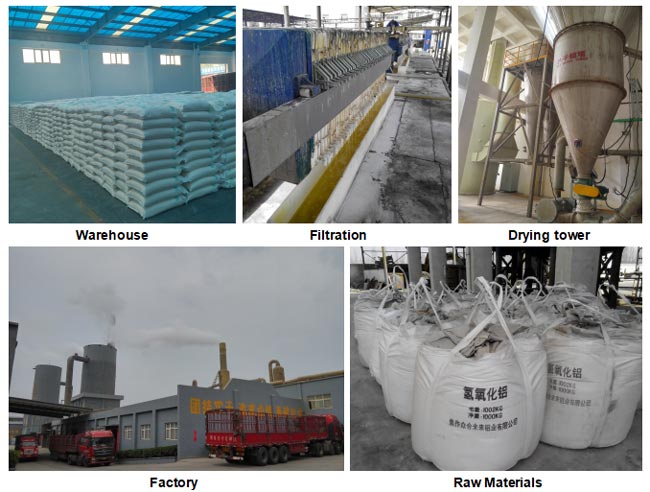
Now Fengbai PAC poly aluminium chloride chemicals have been exported to more than 30+ countries, including Indonesia, Vietnam, Philippines, Malaysia, Singapore, Thailand, Russia, Ecuador, Colombia and other countries. therefore, our PAC products are also well received by many new and old foreign customers. Most of these customers have established long-term cooperative relationships with Fengbai Company. If you are looking for high-quality poly aluminium chloride PAC chemical for water treatment, please contact us online any time.
Why Choose Fengbai
- With more than 15+ years of experience in PAC water treatment chemicals industry.
- Fengbai has its own factory, the advanced production technology and equipment.
- All of our PAC poly aluminium chloride chemicals have passed ISO 9001:2015, SGS certifications.
- Our main markets are Southeast Asia, Middle East, Africa, South America, etc.
- We always provide super quality poly aluminium chloride powder, competitive factory prices and excellent service for all the customers.

